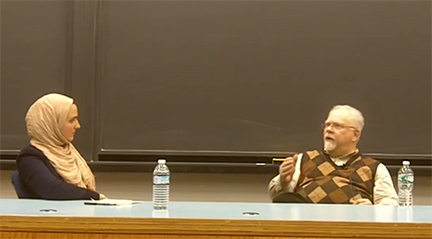
A video of Professor Richard Bulliet speaking about “Current Affairs through the Lens of Islamic History” at Princeton University is on December 4, 2013 is available online.

A video of Professor Richard Bulliet speaking about “Current Affairs through the Lens of Islamic History” at Princeton University is on December 4, 2013 is available online.

from Sabah, Nisan 2, 2013
The last 77 members of the Ottoman dynasty, which are spread out throughout a wide geography spanning from the United States to Jordan, are now in communication with one another through a group formed on the popular social networking website Facebook.
Some were forced to get by through selling pages of gold-engraved Korans. Others were forced to sleep on the coast and to travel by coal trains. Then there were the ones who died before being able to scramble up the money for a ticket to return to their homeland when Turkey finally granted permission for the members of the Ottoman dynasty to return after being forced to spend 50 years in exile. The remaining members of the dynasty who were forced into exile following the downfall of the Ottoman Empire gathered for the first time ever in the London Embassy in February in an event hosted by Foreign Minister Ahmet DavutoÄŸlu.
SABAH went and knocked on the door of one of the remaining members of the Ottoman family who resides in England. The oldest remaining member of the dynasty, Osman Selaheddin OsmanoÄŸlu, who is the grandson to Sultan Murad V, relayed to us his experience of being one of the remaining members of such a legacy:
THEY TRAVELLED FROM COUNTRY TO COUNTRY: “My father, Ali Vasıb Efendi was born in the ÇıraÄŸan Palace. He was a graduate of Galatasaray High School and was sent into exile at the age of 21. They first went to Budapest, Hungary where they stayed for six months. Then he and my grandfather settled in Nice, France where they lived for 11 years. My mother is the granddaughter of Sultan Mehmed V. They later went to Egypt, which became a central location for members of the Ottoman dynasty. I was born there during World War II.” Continue reading THE LAST OTTOMANS ARE GATHERING ON FACEBOOK
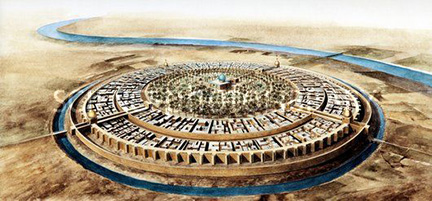
BAGHDAD: CRADLE OF CULTURE AND CIVILIZATION, 1013-2013
On November 15-16, 2013 there will be a conference on Baghdad co-organized by the Iraqi Cultural Center (ICC) and The American Academic Research Institute in Iraq (TAARII). The sessions will be held at the Iraqi Cultural Center, 1630 Connecticut Avenue, Washington, DC 20009
Draft Program
FRIDAY, NOVEMBER 15
9:00. Welcoming remarks. Mohammad Alturaihi (Iraqi Cultural Center) and McGuire Gibson (TAARII)
POLITICAL, ECONOMIC, AND SOCIAL LIFE OF MEDIEVAL BAGHDAD
Chase Robinson (CUNY Graduate Center), “Baghdad and Islamic Cosmopolitanismâ€
Stephen Humphreys (UC-Santa Barbara), “Islam’s First Imperial City: Baghdad from 763 to 945”
Sydney Griffith (Catholic University of America), “The Cultivation of Philosophy and Interreligious Colloquy in Abbasid Baghdad: A Convivencia of Jews, Christians, and Muslims”
Roy Mottahedeh (Harvard University), “The Twilight of Buyid Baghdadâ€
Richard Bulliet (Columbia University), “The Economic Rise and Fall of Medieval Baghdadâ€
12:30-2:00. Lunch
THE MAKING OF MODERN BAGHDAD
Abbas Kadhim (Boston University Institute for Iraqi Studies), “Baghdad’s First Encounter with Modernity (1869-1871)”
Sara Pursley (CUNY Graduate Center), “Familiar Futures: Reforming the Iraqi Family in the Age of Developmentâ€
Eric Davis (Rutgers University), “Pluralism or Sectarianism? Baghdad and the Production of Political Space in Iraqâ€
Discussion
SATURDAY, NOVEMBER 16
9:00
LITERARY AND CULTURAL LIFE IN MEDIEVAL AND MODERN BAGHDAD
Samer Ali (University of Texas at Austin), “When the Night: Having Fun in Medieval Baghdadâ€
Suzanne Stetkevych (Georgetown University/Indiana University), “Arabic Poetry and the Invention of the Abbasid Golden Ageâ€
Fawzi Kareem (Poet/Writer/Painter), “Witnessing Iraq’s Contemporary Cultureâ€
Fatima Ali (Social Cases Performing Arts Company), “Being a Theatre Maker in Post-2003 Baghdad: Challenges and Realities†Continue reading BAGHDAD: CRADLE OF CULTURE AND CIVILIZATION, 1013-2013
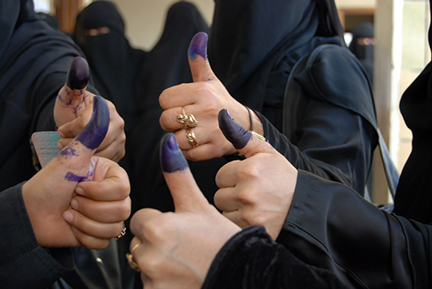
By Samira Ali BinDaair, Sanaa, Republic of Yemen
[for Part One of this essay, click here]
Islam and Democracy
“Al-adala” (Justice) is a keyword in Islam, and Islam like the great religions preceding it came to regulate man’s life on earth and Allah sent many prophets to admonish the people who had gone to excesses and violated “Nawamis al-kawn” (Allah’s laws governing human interaction with the cosmos). Islam came to complete all the preceding messages in its being comprehensive, encompassing both the spiritual and material. When it is said in the Holy Quran that Allah has created man and jinn to worship Him, obedience to Allah’s laws of how man is to conduct himself on earth is part of that process of worship. In reading the Hadith literature (sayings of the Prophet PBH) and the Sira (biography of the Prophet,PBH), one can see how Islamic teachings were operationalized and exemplified, and what stands out is the absolute sense of justice in Islam.
The way Islamic affairs are to be conducted is through a consultative process (Shura) and in fact the concept of Shura is so important in Islam that a whole Sura (chapter) has been devoted to Shura. In Surat al Shura (ayya 38), it says: “Those who hearken to their Lord and establish regular prayer ….. who conduct their affairs by mutual consultation”. In choosing their leaders, Muslims should undertake the “Mubaya” ( declaring allegiance through the process of “Ijmaa” ( general consensus). No one practiced Shura more than the Prophet (PBH) himself. He always consulted with young and old on all matters. He consulted with Um Salama and Zainab bint Gahsh (wives of the Prophet) and respected their opinions. When the message was first revealed to him, he consulted with Khadija (his first wife) who reassured him and allayed his fears and consulted with her couisin Waraka ibn Nofal Christian monk at the time) who in turn reassured him that it was the angel Gabriel who had also been sent to prophets before him. During the battle of the “Khandak” (trenches) Salman Al-Farisi had informed the Prophet(PBH) about building trenches in battles as practiced in Persia where he came from; this was then adopted by the Muslims. The Prophet(PBH) was not autocratic and left some worldly matters to others who knew better than him. When when farmers in Medina asked him about cross pollination in date planting, his answer was:”You know better about these affairs”. Continue reading Democracy … the West … and Islam: Part Two
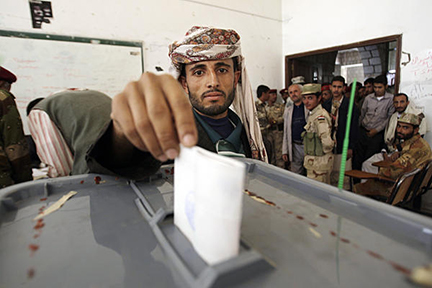
Yemeni man voting; photo by Hani Mohammed/AP
By Samira Ali BinDaair, Sanaa, Republic of Yemen
This essay is an attempt at shedding some light on the relationship between democracy, Islam and the Western world and in the process dispelling some of the misconceptions about the chasm between Islam and democracy. It is nowhere easy for the entire society to have unanimity on any given issue let alone such a complex one as what constitutes good governance and the best political system to be adopted. The Arab world has tried it all but I would like to point out that any system when transplanted and adopted without the necessary conditions for its success is bound to fail, leading to the condemnation of the system rather than analysis of the causes of failure in implementation.
Democracy as a pure concept
I would like to start with the concept of democracy which some Muslims have rejected on the basis of its emanating from the West within secular governments and secular ideas. However, if one examines the concept in its pure form it simply means rule of the people by the people for the people. To demystify it further, what it simply boils down to is that people have a voice in national affairs and choice of their leader and by virtue of the same fact are able to remove the leader through general consensus and legal means if the leader proves to be incapable of living up to the responsibilities entrusted to him/her. Continue reading Democracy … the West … and Islam: Part One
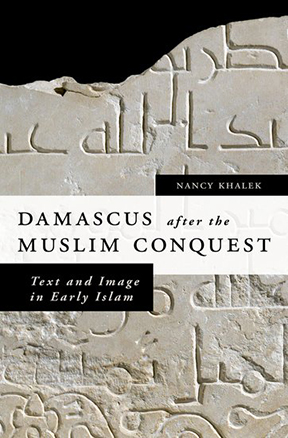
[The following is a link to an interview with Professor Nancy Khalek on her recent book, Damascus after the Muslim Conquest: Text and Image in Early Islam
Oxford University Press, 2011]
by Matthew Long, New Books in Islamic Studies, September 6, 2013
A top five finalist for the Best First Book in the History of Religion Award, Damascus after the Muslim Conquest (Oxford University Press, 2011) by Nancy Khalek, professor of Religious Studies at Brown University, is a study of the city of Damascus, the seat of power for the Umayyad dynasty. More specifically, this book explores the interaction between the recently arrived Muslim Arab rulers and the Byzantine-Christian peoples who made up the majority of the population in Syria. Khalek employs both traditional historical texts, such as Ibn ‘AsÄkir’s TÄrÄ«kh Dimashq, along with art and architecture from the region. She displays a mastery of both the Muslim and Christian sources, discerning the value of their historicity but highlighting the narrative and iconographic significance that can be extrapolate from those sources. During her study of the stories and art, the narratives and iconography reveal that the Muslim and Christian cultures of Syria were in a type of dialogue with each other. She takes care to avoid stating this was a replacement one culture or one borrowing from anther, but instead wishes to portray a blending of these cultures; a blending whose legacy lived on for centuries. Khalek’s work is truly a significant contribution to the field of Islamic Studies and an indispensable interdisciplinary study for both its use of a variety of lesser known source material and its re-imagining of Umayyad history in Syria.

A recent Jon Stewart episode pokes fun at the artificial boundaries of the colonially constructed states of the Middle East. Check it out here at The Atlantic online.
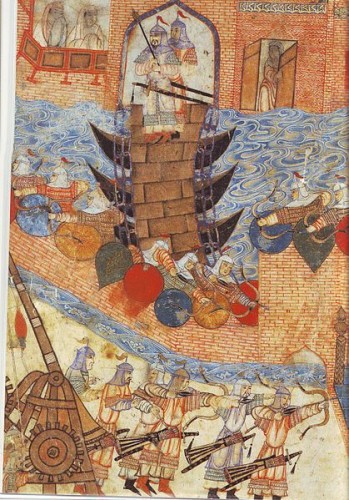
How to Invade Iraq: The Mongol Way
By Peter Konieczny
[Paper given at the 42nd International Congress on Medieval Studies, held at Western Michigan University (2007) and online here.]
When I began researching the Mongol conquest of Baghdad, I came across an account by an Iraqi writer from the early fourteenth-century. With much excitement I found the relevant passage, and began to read it. He summed up the siege and fall of Baghdad with these words: “Even a brief mention of it would be terrible to hear – how much worse its recapitulation in detail! Things happened which I shall not record, imagine them and do not ask for a description!â€
Despite this unpromising beginning, I soon found a wealth of information from contemporary writers and chroniclers, including those who were on the saw the event firsthand. For the last couple of years I have been piecing this story together, not only because the story of the first conquest of Baghdad is an interesting one in its own right, but also because it adds some insights into the present-day situation in Iraq.
Despite it being such an important historical event, the story of Baghdad’s fall has been poorly served by historians. Most Muslim historians deal more with alleged collaboration by Shi’ites with the Mongols against the Sunni Abbasid Caliphate than with anything else, while Western historians have usually focused on the most outrageous stories associated with the invasion, often repeating wild claims that millions of people were killed and that Baghdad was completely destroyed by the Mongols.
The short amount of time here prevents me from saying everything I want to say, so in some sections I am going to be very brief. Hopefully, most of you have got my handout which outlines the events and gives some chronicle excerpts. I also have a couple of overheads to show some maps of Iraq, in case someone is not familiar with the country. Continue reading The Battle for Baghdad